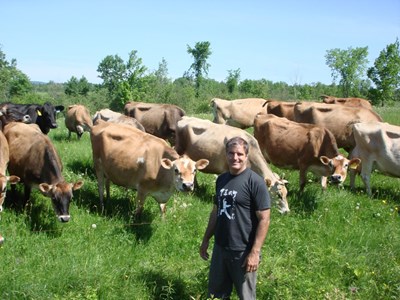
When I ran for Governor in 2020, a cornerstone of my policy agenda focused on small farms and increased local food production. Increasing inflation pressures are now exposing the dangers of a food system dependent on distant lands – and corporations – for sustainability. I am publishing a book that proposes how regenerative agriculture and local farming can decrease pollution and fossil fuel use while increasing the availability of healthier, fresher, more affordable food. Food prices will continue to increase at a faster pace than underlying inflation, due to the compounded input costs of petroleum and natural gas. Grain-fed meats, especially beef, will increase in price dramatically.
As your Senator, I will strongly advocate to support Vermont farms to increase production of healthy, marketable foods, and to make them more widely available to Vermonters. I have been writing about the dangers of food inflation and industrial dependency for many years. The policy prescriptions are the same now as they were in my 2020 Farming Manifesto:
Vermont’s education costs, pensions, bureaucratic bloat, and healthcare administration expenses are all unsustainable. Our nation’s unhealthy, environmentally destructive, corporate-dominated industrial food production system is similarly unsustainable. In our current plight, we see these twin menaces converge. We are increasingly dependent on toxic food from distant lands, and a government bureaucracy that is similarly distant: both are disconnected from our Vermont heritage. It’s as if we have abandoned the lessons of the Great Depression, and must relive that collapse in order to learn anew.
The 2020 Vermont Farming Manifesto is an integrated explanation of what Vermont needs to do to reclaim its identity, its culture, its food quality and security, and its physical and economic health. It is also an unapologetic condemnation of the progressive government expansion that is strangling us all, and the progressive “climate action initiatives” that have thereby been spawned. It does not deny that we are destroying the ecosystem -- it calls for us to become “woke” to our personal responsibility to address pollution, instead of an ideological fascination with an Orwellian government intrusion which will actually just delay real improvement in our economic and environmental condition, and lead us to increased dependence on foreign corporations and callous industrialism.
At root what is proposed is that Vermont radically “incentivize” increased food production by small, sustainable farms, specifically by providing tax relief to counter the excessive tax burden currently stifling farm profitability. Additional proposals will help improve marketing, distribution, and sales of quality Vermont food products. All businesses will benefit; our culture will be reclaimed; we will actually produce valuable goods for export, built proudly on the world-famous Vermont “brand.” This plan is held up in deliberate contrast to proposed regressive taxes on our poorest citizens to acquire solar panels and EV cars from other states and countries -- such proposals bolster their production lines while transferring wealth out of, not into, Vermont. Economics 101. Agriculture is Vermont’s history: it is also Vermont’s future.
Nurturing Vermont farms is a win-win-win: food security and quality, pollution reduction, and sustained economic and agricultural growth. It’s a no-brainer for traditional Vermonters.